Report: Workplace Culture and its Impact on Organisational Efficiency
VerifiedAdded on 2020/10/05
|19
|5948
|188
Report
AI Summary
This report provides a comprehensive analysis of workplace culture and its impact on organizational efficiency, using Iceland as a case study. It begins with an introduction to workplace culture, emphasizing its influence on employee morale, productivity, and engagement. The main body delves into Iceland's workplace culture, highlighting its significance in attracting talent, driving employee retention, and fostering customer loyalty. The report then explores corporate sustainability, emphasizing the importance of a sustainable workforce and ethical practices. It further examines formal and informal relationships within the organization, policies related to cultural diversity, and the values of the organization. Critical evaluations are conducted through PESTLE and SWOT analyses, assessing Iceland's strengths, weaknesses, opportunities, and threats, as well as external factors affecting organizational culture. The report concludes by summarizing the key findings and implications of workplace culture on organizational success.
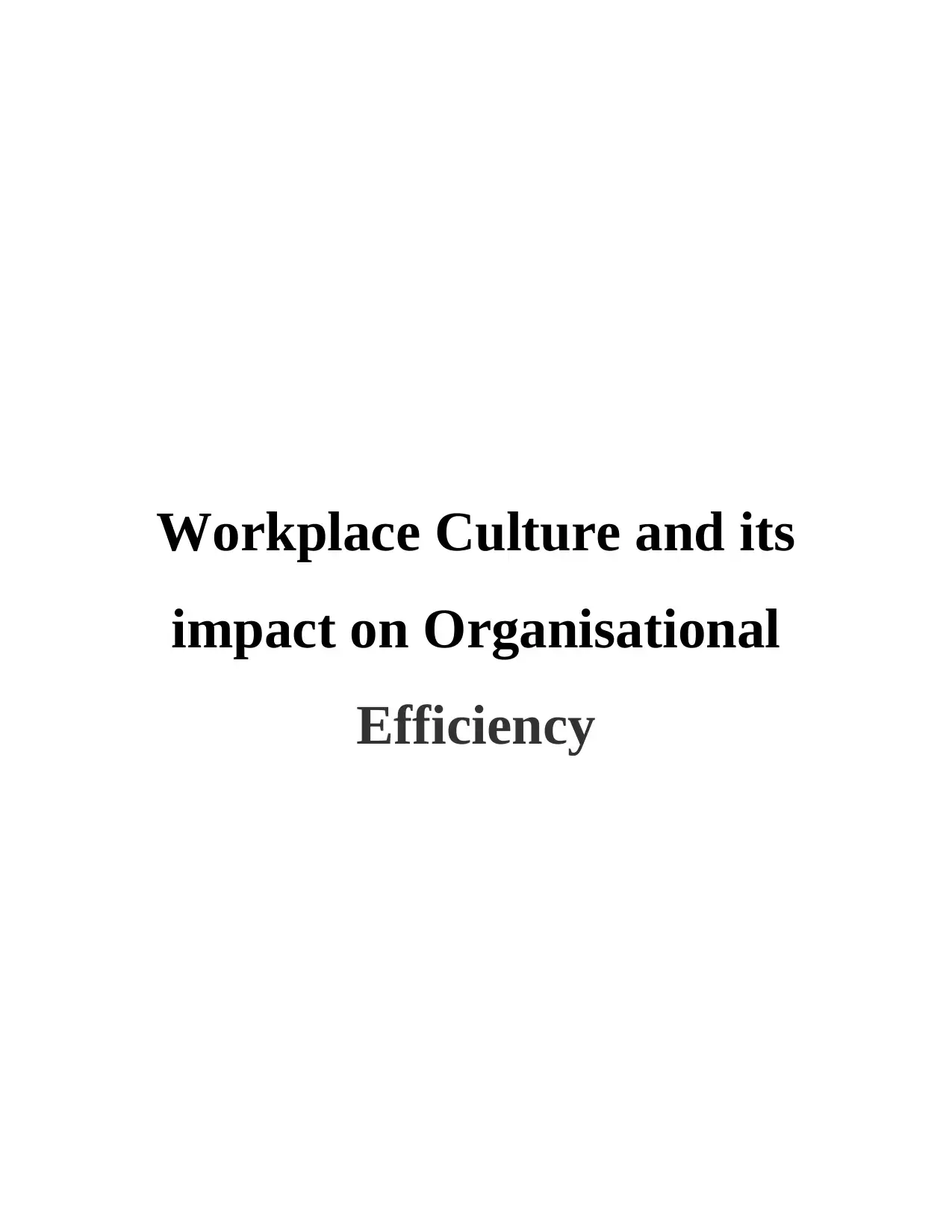
Workplace Culture and its
impact on Organisational
Efficiency
impact on Organisational
Efficiency
Paraphrase This Document
Need a fresh take? Get an instant paraphrase of this document with our AI Paraphraser
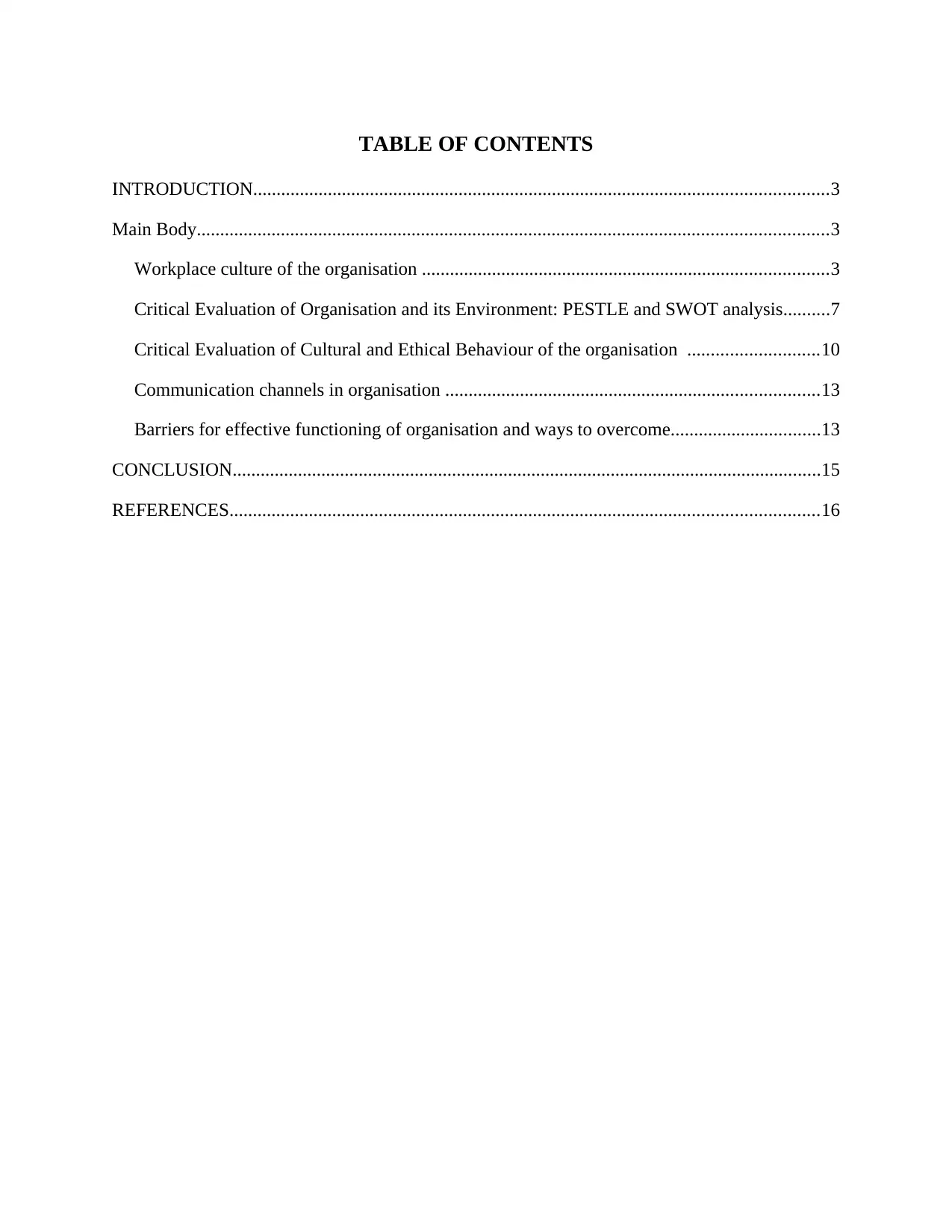
TABLE OF CONTENTS
INTRODUCTION...........................................................................................................................3
Main Body.......................................................................................................................................3
Workplace culture of the organisation .......................................................................................3
Critical Evaluation of Organisation and its Environment: PESTLE and SWOT analysis..........7
Critical Evaluation of Cultural and Ethical Behaviour of the organisation ............................10
Communication channels in organisation ................................................................................13
Barriers for effective functioning of organisation and ways to overcome................................13
CONCLUSION..............................................................................................................................15
REFERENCES..............................................................................................................................16
INTRODUCTION...........................................................................................................................3
Main Body.......................................................................................................................................3
Workplace culture of the organisation .......................................................................................3
Critical Evaluation of Organisation and its Environment: PESTLE and SWOT analysis..........7
Critical Evaluation of Cultural and Ethical Behaviour of the organisation ............................10
Communication channels in organisation ................................................................................13
Barriers for effective functioning of organisation and ways to overcome................................13
CONCLUSION..............................................................................................................................15
REFERENCES..............................................................................................................................16
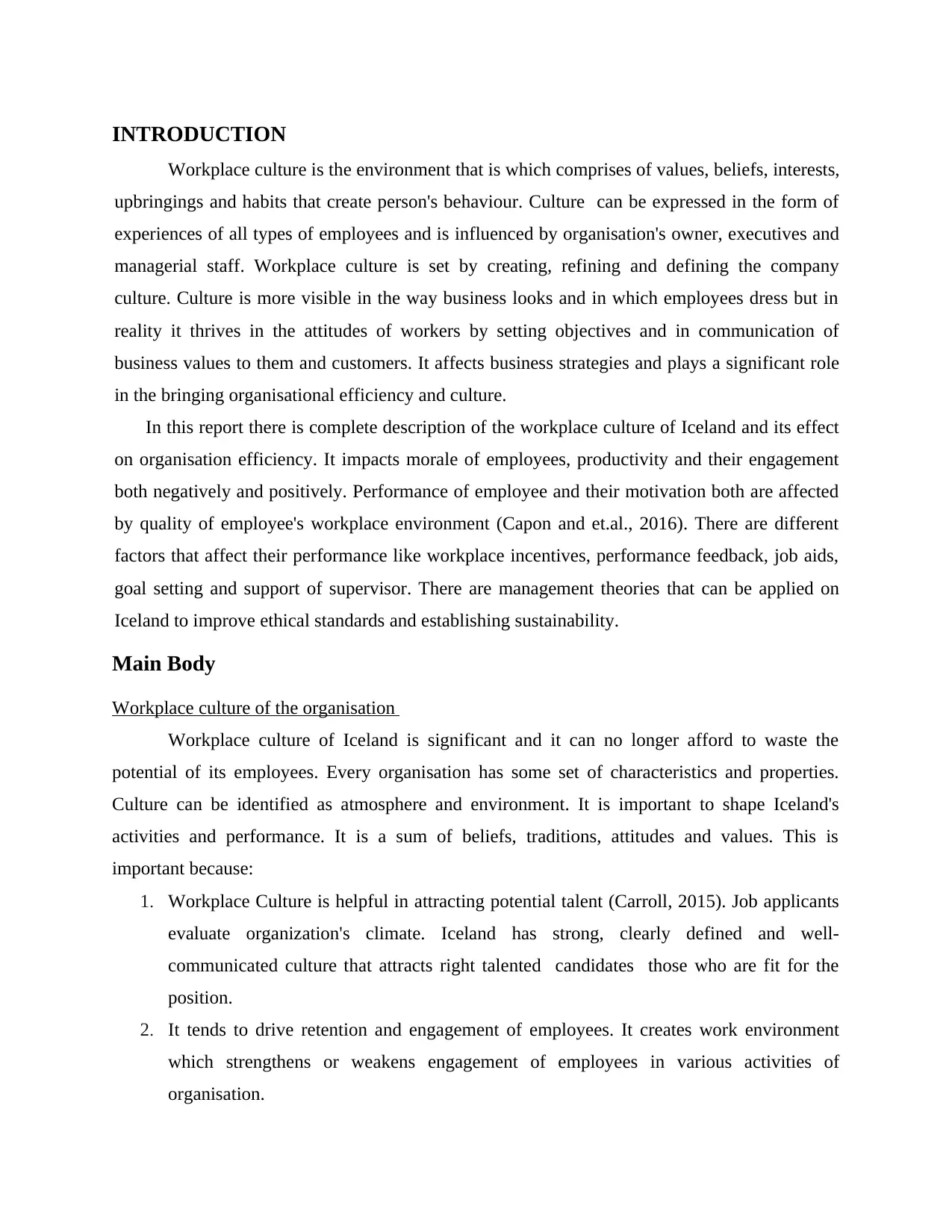
INTRODUCTION
Workplace culture is the environment that is which comprises of values, beliefs, interests,
upbringings and habits that create person's behaviour. Culture can be expressed in the form of
experiences of all types of employees and is influenced by organisation's owner, executives and
managerial staff. Workplace culture is set by creating, refining and defining the company
culture. Culture is more visible in the way business looks and in which employees dress but in
reality it thrives in the attitudes of workers by setting objectives and in communication of
business values to them and customers. It affects business strategies and plays a significant role
in the bringing organisational efficiency and culture.
In this report there is complete description of the workplace culture of Iceland and its effect
on organisation efficiency. It impacts morale of employees, productivity and their engagement
both negatively and positively. Performance of employee and their motivation both are affected
by quality of employee's workplace environment (Capon and et.al., 2016). There are different
factors that affect their performance like workplace incentives, performance feedback, job aids,
goal setting and support of supervisor. There are management theories that can be applied on
Iceland to improve ethical standards and establishing sustainability.
Main Body
Workplace culture of the organisation
Workplace culture of Iceland is significant and it can no longer afford to waste the
potential of its employees. Every organisation has some set of characteristics and properties.
Culture can be identified as atmosphere and environment. It is important to shape Iceland's
activities and performance. It is a sum of beliefs, traditions, attitudes and values. This is
important because:
1. Workplace Culture is helpful in attracting potential talent (Carroll, 2015). Job applicants
evaluate organization's climate. Iceland has strong, clearly defined and well-
communicated culture that attracts right talented candidates those who are fit for the
position.
2. It tends to drive retention and engagement of employees. It creates work environment
which strengthens or weakens engagement of employees in various activities of
organisation.
Workplace culture is the environment that is which comprises of values, beliefs, interests,
upbringings and habits that create person's behaviour. Culture can be expressed in the form of
experiences of all types of employees and is influenced by organisation's owner, executives and
managerial staff. Workplace culture is set by creating, refining and defining the company
culture. Culture is more visible in the way business looks and in which employees dress but in
reality it thrives in the attitudes of workers by setting objectives and in communication of
business values to them and customers. It affects business strategies and plays a significant role
in the bringing organisational efficiency and culture.
In this report there is complete description of the workplace culture of Iceland and its effect
on organisation efficiency. It impacts morale of employees, productivity and their engagement
both negatively and positively. Performance of employee and their motivation both are affected
by quality of employee's workplace environment (Capon and et.al., 2016). There are different
factors that affect their performance like workplace incentives, performance feedback, job aids,
goal setting and support of supervisor. There are management theories that can be applied on
Iceland to improve ethical standards and establishing sustainability.
Main Body
Workplace culture of the organisation
Workplace culture of Iceland is significant and it can no longer afford to waste the
potential of its employees. Every organisation has some set of characteristics and properties.
Culture can be identified as atmosphere and environment. It is important to shape Iceland's
activities and performance. It is a sum of beliefs, traditions, attitudes and values. This is
important because:
1. Workplace Culture is helpful in attracting potential talent (Carroll, 2015). Job applicants
evaluate organization's climate. Iceland has strong, clearly defined and well-
communicated culture that attracts right talented candidates those who are fit for the
position.
2. It tends to drive retention and engagement of employees. It creates work environment
which strengthens or weakens engagement of employees in various activities of
organisation.
⊘ This is a preview!⊘
Do you want full access?
Subscribe today to unlock all pages.

Trusted by 1+ million students worldwide
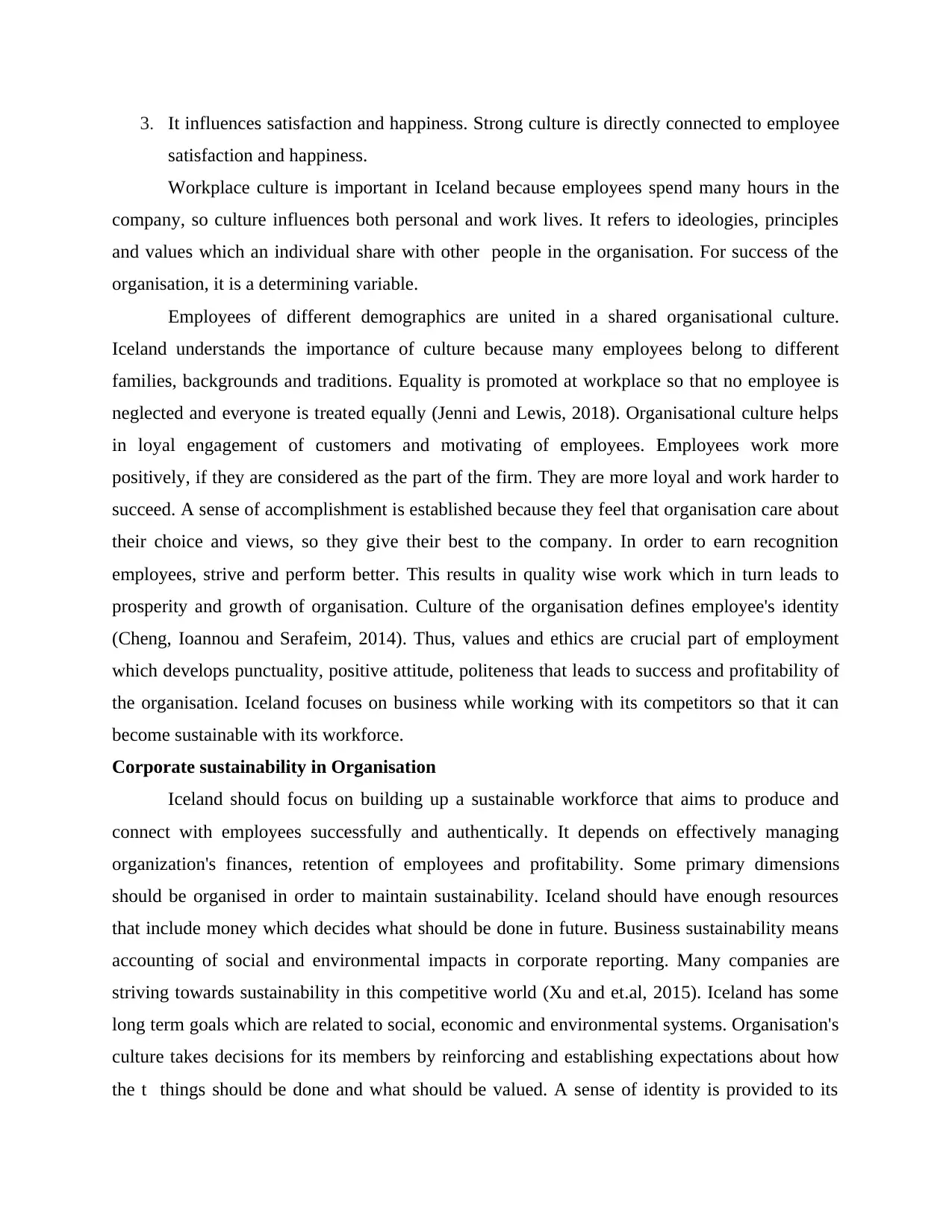
3. It influences satisfaction and happiness. Strong culture is directly connected to employee
satisfaction and happiness.
Workplace culture is important in Iceland because employees spend many hours in the
company, so culture influences both personal and work lives. It refers to ideologies, principles
and values which an individual share with other people in the organisation. For success of the
organisation, it is a determining variable.
Employees of different demographics are united in a shared organisational culture.
Iceland understands the importance of culture because many employees belong to different
families, backgrounds and traditions. Equality is promoted at workplace so that no employee is
neglected and everyone is treated equally (Jenni and Lewis, 2018). Organisational culture helps
in loyal engagement of customers and motivating of employees. Employees work more
positively, if they are considered as the part of the firm. They are more loyal and work harder to
succeed. A sense of accomplishment is established because they feel that organisation care about
their choice and views, so they give their best to the company. In order to earn recognition
employees, strive and perform better. This results in quality wise work which in turn leads to
prosperity and growth of organisation. Culture of the organisation defines employee's identity
(Cheng, Ioannou and Serafeim, 2014). Thus, values and ethics are crucial part of employment
which develops punctuality, positive attitude, politeness that leads to success and profitability of
the organisation. Iceland focuses on business while working with its competitors so that it can
become sustainable with its workforce.
Corporate sustainability in Organisation
Iceland should focus on building up a sustainable workforce that aims to produce and
connect with employees successfully and authentically. It depends on effectively managing
organization's finances, retention of employees and profitability. Some primary dimensions
should be organised in order to maintain sustainability. Iceland should have enough resources
that include money which decides what should be done in future. Business sustainability means
accounting of social and environmental impacts in corporate reporting. Many companies are
striving towards sustainability in this competitive world (Xu and et.al, 2015). Iceland has some
long term goals which are related to social, economic and environmental systems. Organisation's
culture takes decisions for its members by reinforcing and establishing expectations about how
the t things should be done and what should be valued. A sense of identity is provided to its
satisfaction and happiness.
Workplace culture is important in Iceland because employees spend many hours in the
company, so culture influences both personal and work lives. It refers to ideologies, principles
and values which an individual share with other people in the organisation. For success of the
organisation, it is a determining variable.
Employees of different demographics are united in a shared organisational culture.
Iceland understands the importance of culture because many employees belong to different
families, backgrounds and traditions. Equality is promoted at workplace so that no employee is
neglected and everyone is treated equally (Jenni and Lewis, 2018). Organisational culture helps
in loyal engagement of customers and motivating of employees. Employees work more
positively, if they are considered as the part of the firm. They are more loyal and work harder to
succeed. A sense of accomplishment is established because they feel that organisation care about
their choice and views, so they give their best to the company. In order to earn recognition
employees, strive and perform better. This results in quality wise work which in turn leads to
prosperity and growth of organisation. Culture of the organisation defines employee's identity
(Cheng, Ioannou and Serafeim, 2014). Thus, values and ethics are crucial part of employment
which develops punctuality, positive attitude, politeness that leads to success and profitability of
the organisation. Iceland focuses on business while working with its competitors so that it can
become sustainable with its workforce.
Corporate sustainability in Organisation
Iceland should focus on building up a sustainable workforce that aims to produce and
connect with employees successfully and authentically. It depends on effectively managing
organization's finances, retention of employees and profitability. Some primary dimensions
should be organised in order to maintain sustainability. Iceland should have enough resources
that include money which decides what should be done in future. Business sustainability means
accounting of social and environmental impacts in corporate reporting. Many companies are
striving towards sustainability in this competitive world (Xu and et.al, 2015). Iceland has some
long term goals which are related to social, economic and environmental systems. Organisation's
culture takes decisions for its members by reinforcing and establishing expectations about how
the t things should be done and what should be valued. A sense of identity is provided to its
Paraphrase This Document
Need a fresh take? Get an instant paraphrase of this document with our AI Paraphraser
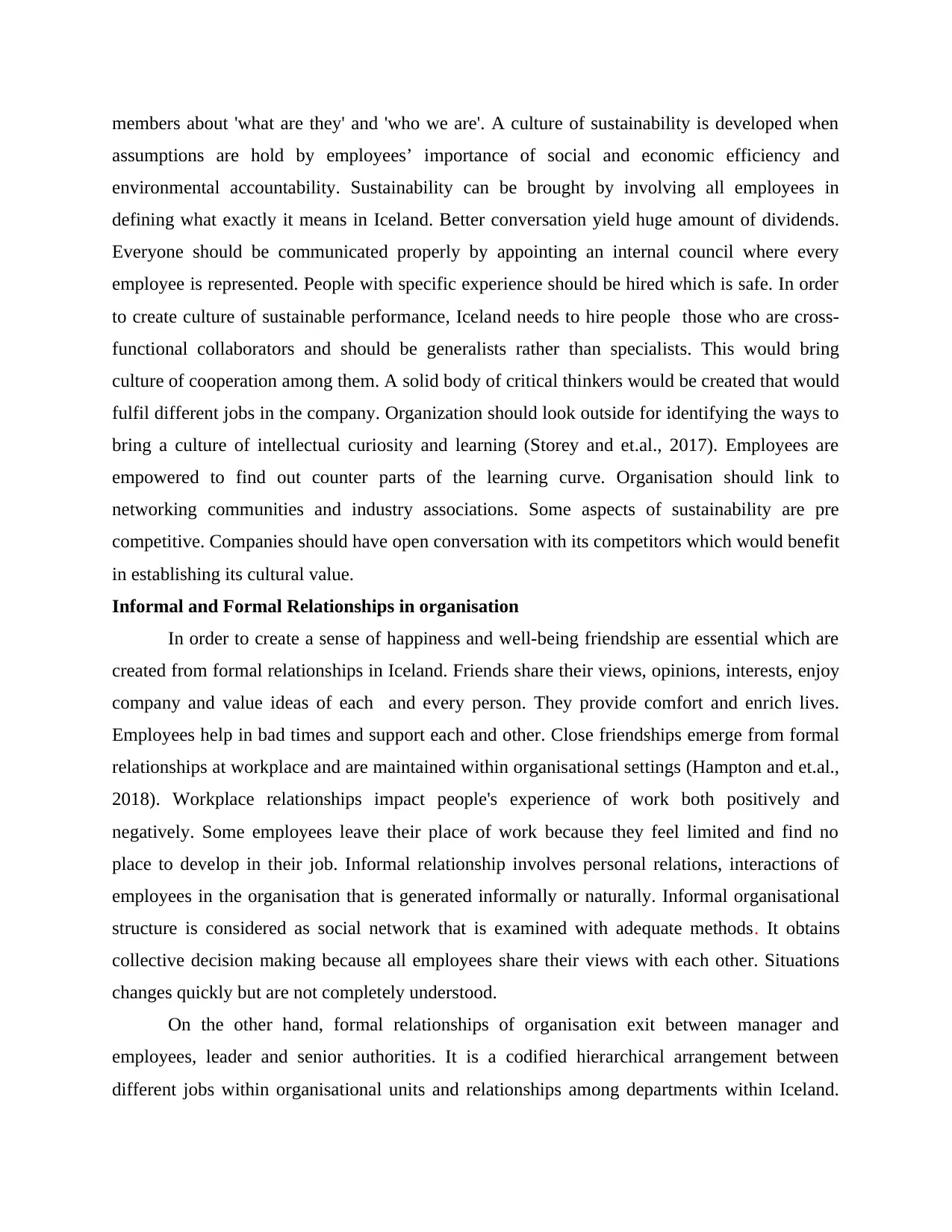
members about 'what are they' and 'who we are'. A culture of sustainability is developed when
assumptions are hold by employees’ importance of social and economic efficiency and
environmental accountability. Sustainability can be brought by involving all employees in
defining what exactly it means in Iceland. Better conversation yield huge amount of dividends.
Everyone should be communicated properly by appointing an internal council where every
employee is represented. People with specific experience should be hired which is safe. In order
to create culture of sustainable performance, Iceland needs to hire people those who are cross-
functional collaborators and should be generalists rather than specialists. This would bring
culture of cooperation among them. A solid body of critical thinkers would be created that would
fulfil different jobs in the company. Organization should look outside for identifying the ways to
bring a culture of intellectual curiosity and learning (Storey and et.al., 2017). Employees are
empowered to find out counter parts of the learning curve. Organisation should link to
networking communities and industry associations. Some aspects of sustainability are pre
competitive. Companies should have open conversation with its competitors which would benefit
in establishing its cultural value.
Informal and Formal Relationships in organisation
In order to create a sense of happiness and well-being friendship are essential which are
created from formal relationships in Iceland. Friends share their views, opinions, interests, enjoy
company and value ideas of each and every person. They provide comfort and enrich lives.
Employees help in bad times and support each and other. Close friendships emerge from formal
relationships at workplace and are maintained within organisational settings (Hampton and et.al.,
2018). Workplace relationships impact people's experience of work both positively and
negatively. Some employees leave their place of work because they feel limited and find no
place to develop in their job. Informal relationship involves personal relations, interactions of
employees in the organisation that is generated informally or naturally. Informal organisational
structure is considered as social network that is examined with adequate methods. It obtains
collective decision making because all employees share their views with each other. Situations
changes quickly but are not completely understood.
On the other hand, formal relationships of organisation exit between manager and
employees, leader and senior authorities. It is a codified hierarchical arrangement between
different jobs within organisational units and relationships among departments within Iceland.
assumptions are hold by employees’ importance of social and economic efficiency and
environmental accountability. Sustainability can be brought by involving all employees in
defining what exactly it means in Iceland. Better conversation yield huge amount of dividends.
Everyone should be communicated properly by appointing an internal council where every
employee is represented. People with specific experience should be hired which is safe. In order
to create culture of sustainable performance, Iceland needs to hire people those who are cross-
functional collaborators and should be generalists rather than specialists. This would bring
culture of cooperation among them. A solid body of critical thinkers would be created that would
fulfil different jobs in the company. Organization should look outside for identifying the ways to
bring a culture of intellectual curiosity and learning (Storey and et.al., 2017). Employees are
empowered to find out counter parts of the learning curve. Organisation should link to
networking communities and industry associations. Some aspects of sustainability are pre
competitive. Companies should have open conversation with its competitors which would benefit
in establishing its cultural value.
Informal and Formal Relationships in organisation
In order to create a sense of happiness and well-being friendship are essential which are
created from formal relationships in Iceland. Friends share their views, opinions, interests, enjoy
company and value ideas of each and every person. They provide comfort and enrich lives.
Employees help in bad times and support each and other. Close friendships emerge from formal
relationships at workplace and are maintained within organisational settings (Hampton and et.al.,
2018). Workplace relationships impact people's experience of work both positively and
negatively. Some employees leave their place of work because they feel limited and find no
place to develop in their job. Informal relationship involves personal relations, interactions of
employees in the organisation that is generated informally or naturally. Informal organisational
structure is considered as social network that is examined with adequate methods. It obtains
collective decision making because all employees share their views with each other. Situations
changes quickly but are not completely understood.
On the other hand, formal relationships of organisation exit between manager and
employees, leader and senior authorities. It is a codified hierarchical arrangement between
different jobs within organisational units and relationships among departments within Iceland.
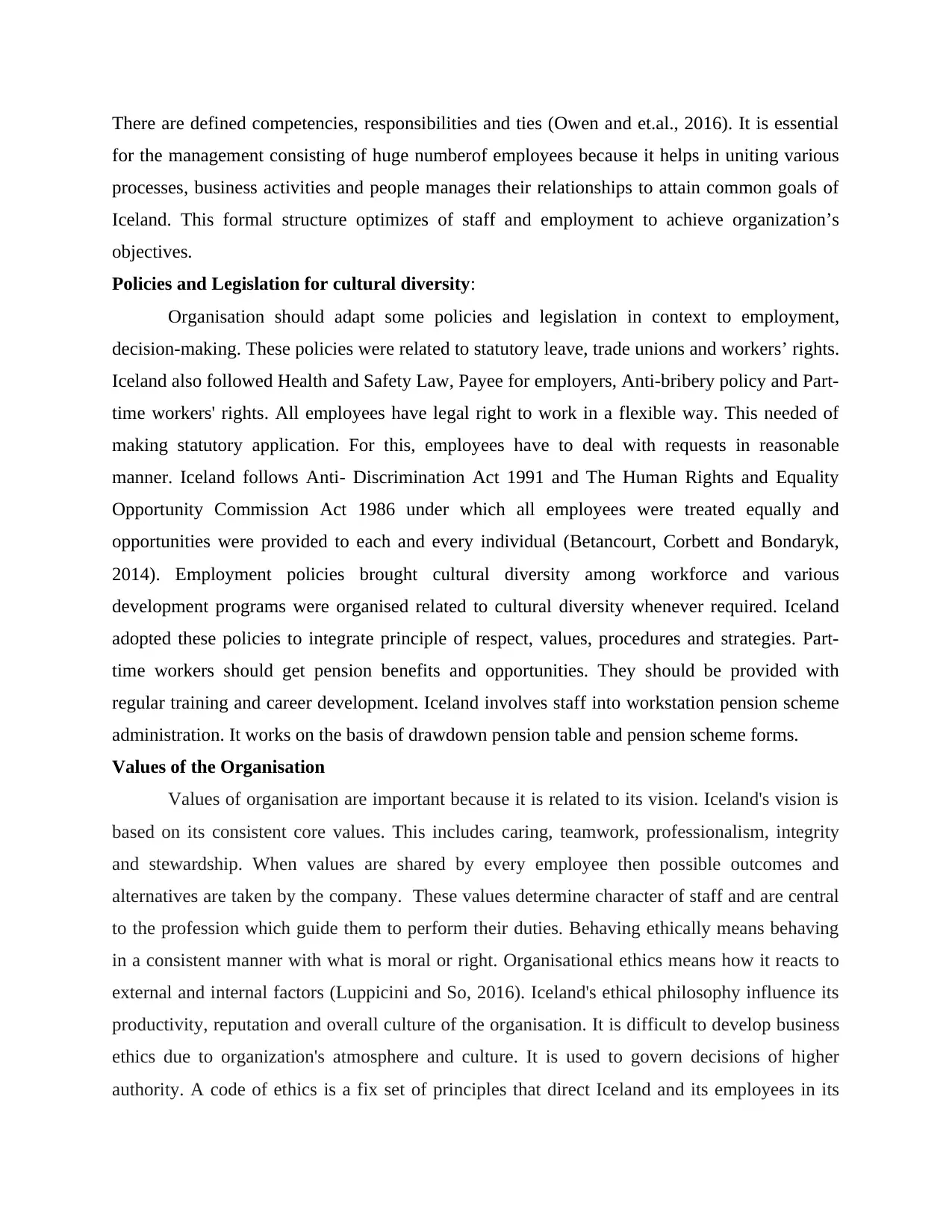
There are defined competencies, responsibilities and ties (Owen and et.al., 2016). It is essential
for the management consisting of huge numberof employees because it helps in uniting various
processes, business activities and people manages their relationships to attain common goals of
Iceland. This formal structure optimizes of staff and employment to achieve organization’s
objectives.
Policies and Legislation for cultural diversity:
Organisation should adapt some policies and legislation in context to employment,
decision-making. These policies were related to statutory leave, trade unions and workers’ rights.
Iceland also followed Health and Safety Law, Payee for employers, Anti-bribery policy and Part-
time workers' rights. All employees have legal right to work in a flexible way. This needed of
making statutory application. For this, employees have to deal with requests in reasonable
manner. Iceland follows Anti- Discrimination Act 1991 and The Human Rights and Equality
Opportunity Commission Act 1986 under which all employees were treated equally and
opportunities were provided to each and every individual (Betancourt, Corbett and Bondaryk,
2014). Employment policies brought cultural diversity among workforce and various
development programs were organised related to cultural diversity whenever required. Iceland
adopted these policies to integrate principle of respect, values, procedures and strategies. Part-
time workers should get pension benefits and opportunities. They should be provided with
regular training and career development. Iceland involves staff into workstation pension scheme
administration. It works on the basis of drawdown pension table and pension scheme forms.
Values of the Organisation
Values of organisation are important because it is related to its vision. Iceland's vision is
based on its consistent core values. This includes caring, teamwork, professionalism, integrity
and stewardship. When values are shared by every employee then possible outcomes and
alternatives are taken by the company. These values determine character of staff and are central
to the profession which guide them to perform their duties. Behaving ethically means behaving
in a consistent manner with what is moral or right. Organisational ethics means how it reacts to
external and internal factors (Luppicini and So, 2016). Iceland's ethical philosophy influence its
productivity, reputation and overall culture of the organisation. It is difficult to develop business
ethics due to organization's atmosphere and culture. It is used to govern decisions of higher
authority. A code of ethics is a fix set of principles that direct Iceland and its employees in its
for the management consisting of huge numberof employees because it helps in uniting various
processes, business activities and people manages their relationships to attain common goals of
Iceland. This formal structure optimizes of staff and employment to achieve organization’s
objectives.
Policies and Legislation for cultural diversity:
Organisation should adapt some policies and legislation in context to employment,
decision-making. These policies were related to statutory leave, trade unions and workers’ rights.
Iceland also followed Health and Safety Law, Payee for employers, Anti-bribery policy and Part-
time workers' rights. All employees have legal right to work in a flexible way. This needed of
making statutory application. For this, employees have to deal with requests in reasonable
manner. Iceland follows Anti- Discrimination Act 1991 and The Human Rights and Equality
Opportunity Commission Act 1986 under which all employees were treated equally and
opportunities were provided to each and every individual (Betancourt, Corbett and Bondaryk,
2014). Employment policies brought cultural diversity among workforce and various
development programs were organised related to cultural diversity whenever required. Iceland
adopted these policies to integrate principle of respect, values, procedures and strategies. Part-
time workers should get pension benefits and opportunities. They should be provided with
regular training and career development. Iceland involves staff into workstation pension scheme
administration. It works on the basis of drawdown pension table and pension scheme forms.
Values of the Organisation
Values of organisation are important because it is related to its vision. Iceland's vision is
based on its consistent core values. This includes caring, teamwork, professionalism, integrity
and stewardship. When values are shared by every employee then possible outcomes and
alternatives are taken by the company. These values determine character of staff and are central
to the profession which guide them to perform their duties. Behaving ethically means behaving
in a consistent manner with what is moral or right. Organisational ethics means how it reacts to
external and internal factors (Luppicini and So, 2016). Iceland's ethical philosophy influence its
productivity, reputation and overall culture of the organisation. It is difficult to develop business
ethics due to organization's atmosphere and culture. It is used to govern decisions of higher
authority. A code of ethics is a fix set of principles that direct Iceland and its employees in its
⊘ This is a preview!⊘
Do you want full access?
Subscribe today to unlock all pages.

Trusted by 1+ million students worldwide
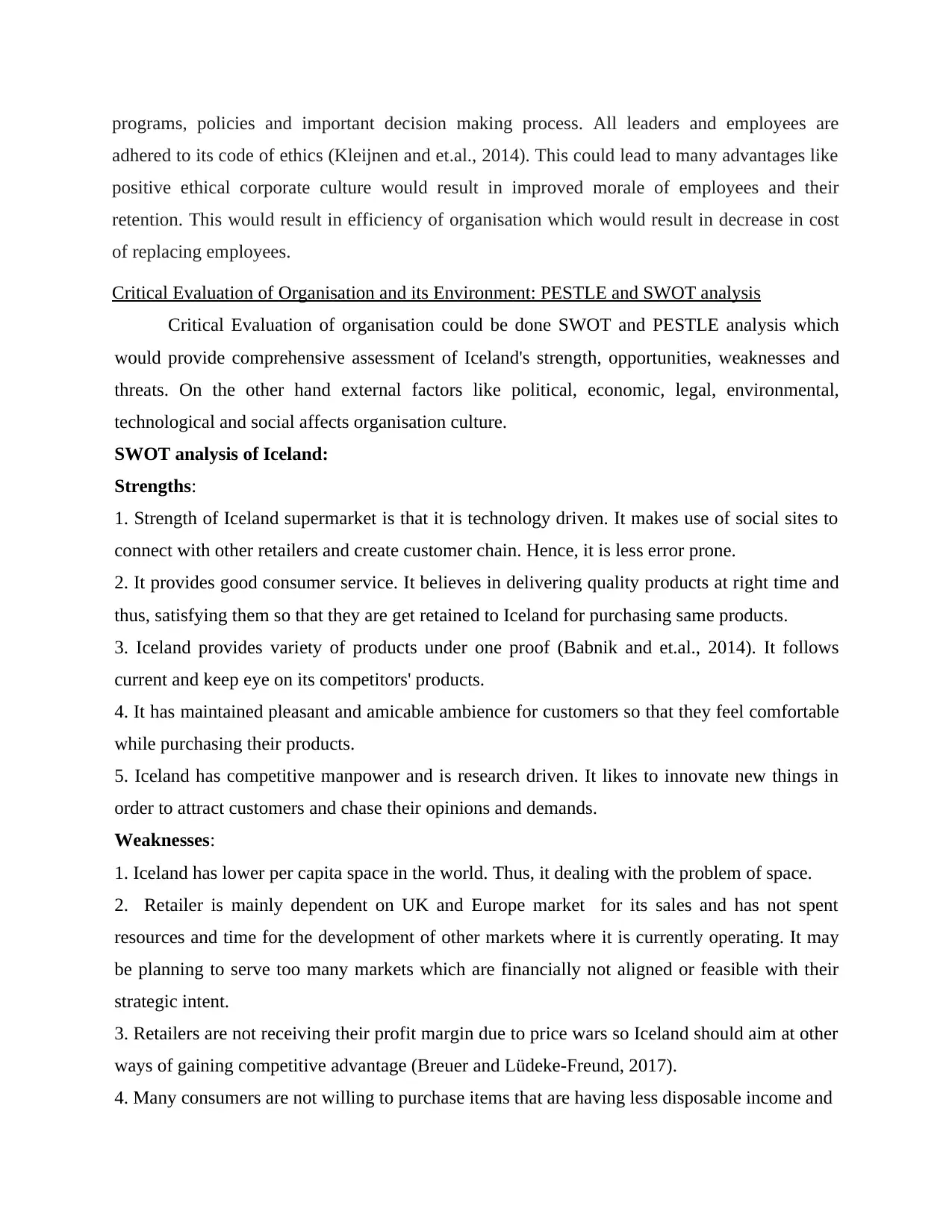
programs, policies and important decision making process. All leaders and employees are
adhered to its code of ethics (Kleijnen and et.al., 2014). This could lead to many advantages like
positive ethical corporate culture would result in improved morale of employees and their
retention. This would result in efficiency of organisation which would result in decrease in cost
of replacing employees.
Critical Evaluation of Organisation and its Environment: PESTLE and SWOT analysis
Critical Evaluation of organisation could be done SWOT and PESTLE analysis which
would provide comprehensive assessment of Iceland's strength, opportunities, weaknesses and
threats. On the other hand external factors like political, economic, legal, environmental,
technological and social affects organisation culture.
SWOT analysis of Iceland:
Strengths:
1. Strength of Iceland supermarket is that it is technology driven. It makes use of social sites to
connect with other retailers and create customer chain. Hence, it is less error prone.
2. It provides good consumer service. It believes in delivering quality products at right time and
thus, satisfying them so that they are get retained to Iceland for purchasing same products.
3. Iceland provides variety of products under one proof (Babnik and et.al., 2014). It follows
current and keep eye on its competitors' products.
4. It has maintained pleasant and amicable ambience for customers so that they feel comfortable
while purchasing their products.
5. Iceland has competitive manpower and is research driven. It likes to innovate new things in
order to attract customers and chase their opinions and demands.
Weaknesses:
1. Iceland has lower per capita space in the world. Thus, it dealing with the problem of space.
2. Retailer is mainly dependent on UK and Europe market for its sales and has not spent
resources and time for the development of other markets where it is currently operating. It may
be planning to serve too many markets which are financially not aligned or feasible with their
strategic intent.
3. Retailers are not receiving their profit margin due to price wars so Iceland should aim at other
ways of gaining competitive advantage (Breuer and Lüdeke-Freund, 2017).
4. Many consumers are not willing to purchase items that are having less disposable income and
adhered to its code of ethics (Kleijnen and et.al., 2014). This could lead to many advantages like
positive ethical corporate culture would result in improved morale of employees and their
retention. This would result in efficiency of organisation which would result in decrease in cost
of replacing employees.
Critical Evaluation of Organisation and its Environment: PESTLE and SWOT analysis
Critical Evaluation of organisation could be done SWOT and PESTLE analysis which
would provide comprehensive assessment of Iceland's strength, opportunities, weaknesses and
threats. On the other hand external factors like political, economic, legal, environmental,
technological and social affects organisation culture.
SWOT analysis of Iceland:
Strengths:
1. Strength of Iceland supermarket is that it is technology driven. It makes use of social sites to
connect with other retailers and create customer chain. Hence, it is less error prone.
2. It provides good consumer service. It believes in delivering quality products at right time and
thus, satisfying them so that they are get retained to Iceland for purchasing same products.
3. Iceland provides variety of products under one proof (Babnik and et.al., 2014). It follows
current and keep eye on its competitors' products.
4. It has maintained pleasant and amicable ambience for customers so that they feel comfortable
while purchasing their products.
5. Iceland has competitive manpower and is research driven. It likes to innovate new things in
order to attract customers and chase their opinions and demands.
Weaknesses:
1. Iceland has lower per capita space in the world. Thus, it dealing with the problem of space.
2. Retailer is mainly dependent on UK and Europe market for its sales and has not spent
resources and time for the development of other markets where it is currently operating. It may
be planning to serve too many markets which are financially not aligned or feasible with their
strategic intent.
3. Retailers are not receiving their profit margin due to price wars so Iceland should aim at other
ways of gaining competitive advantage (Breuer and Lüdeke-Freund, 2017).
4. Many consumers are not willing to purchase items that are having less disposable income and
Paraphrase This Document
Need a fresh take? Get an instant paraphrase of this document with our AI Paraphraser
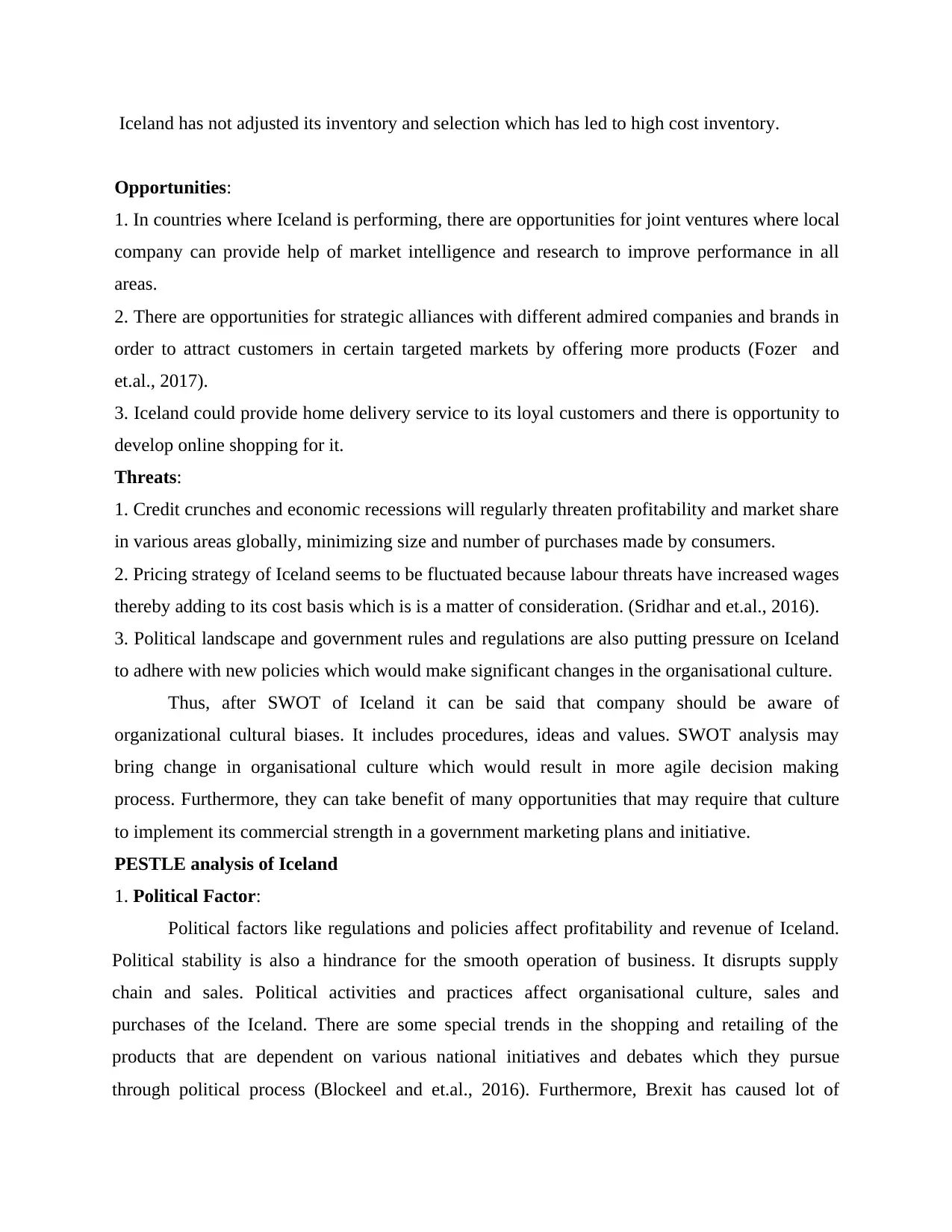
Iceland has not adjusted its inventory and selection which has led to high cost inventory.
Opportunities:
1. In countries where Iceland is performing, there are opportunities for joint ventures where local
company can provide help of market intelligence and research to improve performance in all
areas.
2. There are opportunities for strategic alliances with different admired companies and brands in
order to attract customers in certain targeted markets by offering more products (Fozer and
et.al., 2017).
3. Iceland could provide home delivery service to its loyal customers and there is opportunity to
develop online shopping for it.
Threats:
1. Credit crunches and economic recessions will regularly threaten profitability and market share
in various areas globally, minimizing size and number of purchases made by consumers.
2. Pricing strategy of Iceland seems to be fluctuated because labour threats have increased wages
thereby adding to its cost basis which is is a matter of consideration. (Sridhar and et.al., 2016).
3. Political landscape and government rules and regulations are also putting pressure on Iceland
to adhere with new policies which would make significant changes in the organisational culture.
Thus, after SWOT of Iceland it can be said that company should be aware of
organizational cultural biases. It includes procedures, ideas and values. SWOT analysis may
bring change in organisational culture which would result in more agile decision making
process. Furthermore, they can take benefit of many opportunities that may require that culture
to implement its commercial strength in a government marketing plans and initiative.
PESTLE analysis of Iceland
1. Political Factor:
Political factors like regulations and policies affect profitability and revenue of Iceland.
Political stability is also a hindrance for the smooth operation of business. It disrupts supply
chain and sales. Political activities and practices affect organisational culture, sales and
purchases of the Iceland. There are some special trends in the shopping and retailing of the
products that are dependent on various national initiatives and debates which they pursue
through political process (Blockeel and et.al., 2016). Furthermore, Brexit has caused lot of
Opportunities:
1. In countries where Iceland is performing, there are opportunities for joint ventures where local
company can provide help of market intelligence and research to improve performance in all
areas.
2. There are opportunities for strategic alliances with different admired companies and brands in
order to attract customers in certain targeted markets by offering more products (Fozer and
et.al., 2017).
3. Iceland could provide home delivery service to its loyal customers and there is opportunity to
develop online shopping for it.
Threats:
1. Credit crunches and economic recessions will regularly threaten profitability and market share
in various areas globally, minimizing size and number of purchases made by consumers.
2. Pricing strategy of Iceland seems to be fluctuated because labour threats have increased wages
thereby adding to its cost basis which is is a matter of consideration. (Sridhar and et.al., 2016).
3. Political landscape and government rules and regulations are also putting pressure on Iceland
to adhere with new policies which would make significant changes in the organisational culture.
Thus, after SWOT of Iceland it can be said that company should be aware of
organizational cultural biases. It includes procedures, ideas and values. SWOT analysis may
bring change in organisational culture which would result in more agile decision making
process. Furthermore, they can take benefit of many opportunities that may require that culture
to implement its commercial strength in a government marketing plans and initiative.
PESTLE analysis of Iceland
1. Political Factor:
Political factors like regulations and policies affect profitability and revenue of Iceland.
Political stability is also a hindrance for the smooth operation of business. It disrupts supply
chain and sales. Political activities and practices affect organisational culture, sales and
purchases of the Iceland. There are some special trends in the shopping and retailing of the
products that are dependent on various national initiatives and debates which they pursue
through political process (Blockeel and et.al., 2016). Furthermore, Brexit has caused lot of
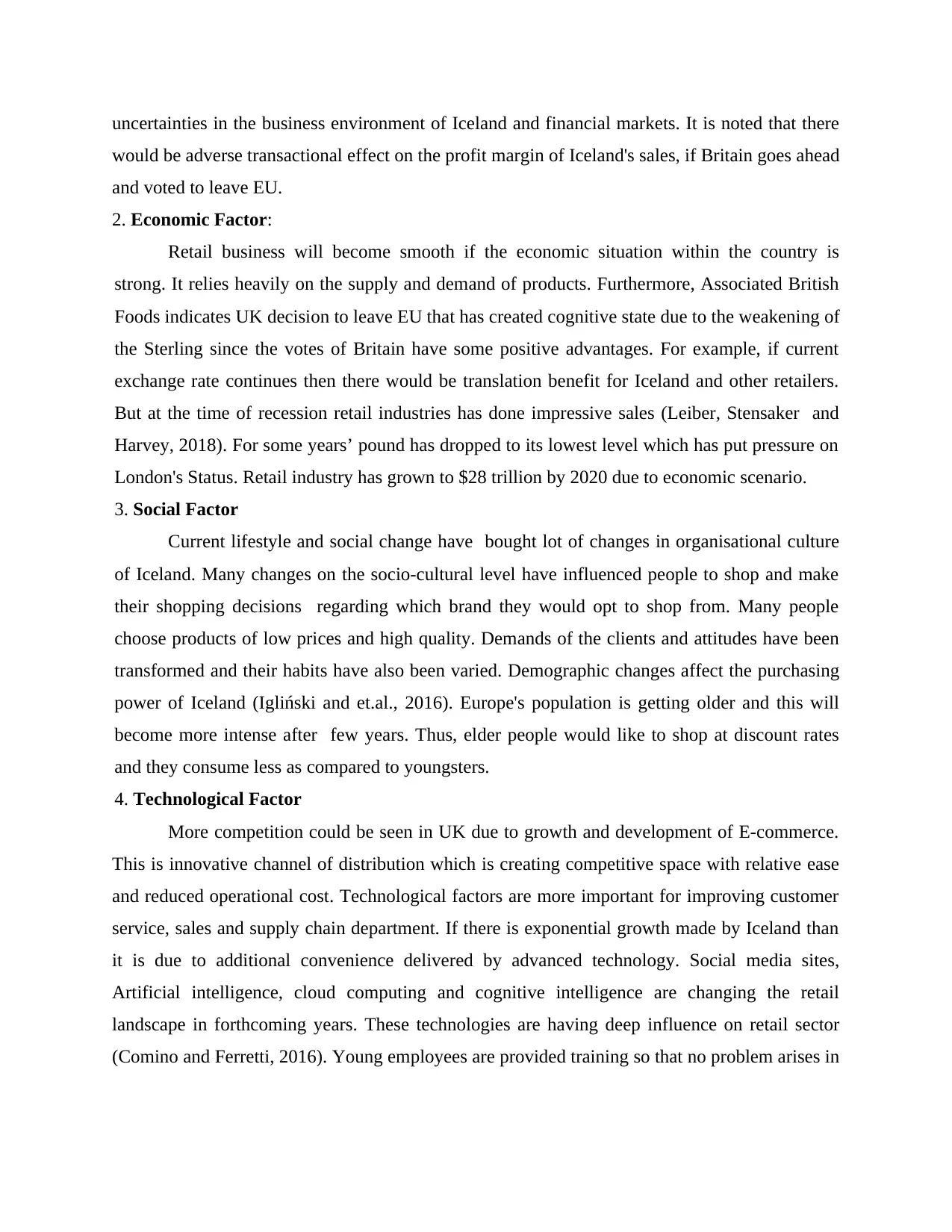
uncertainties in the business environment of Iceland and financial markets. It is noted that there
would be adverse transactional effect on the profit margin of Iceland's sales, if Britain goes ahead
and voted to leave EU.
2. Economic Factor:
Retail business will become smooth if the economic situation within the country is
strong. It relies heavily on the supply and demand of products. Furthermore, Associated British
Foods indicates UK decision to leave EU that has created cognitive state due to the weakening of
the Sterling since the votes of Britain have some positive advantages. For example, if current
exchange rate continues then there would be translation benefit for Iceland and other retailers.
But at the time of recession retail industries has done impressive sales (Leiber, Stensaker and
Harvey, 2018). For some years’ pound has dropped to its lowest level which has put pressure on
London's Status. Retail industry has grown to $28 trillion by 2020 due to economic scenario.
3. Social Factor
Current lifestyle and social change have bought lot of changes in organisational culture
of Iceland. Many changes on the socio-cultural level have influenced people to shop and make
their shopping decisions regarding which brand they would opt to shop from. Many people
choose products of low prices and high quality. Demands of the clients and attitudes have been
transformed and their habits have also been varied. Demographic changes affect the purchasing
power of Iceland (Igliński and et.al., 2016). Europe's population is getting older and this will
become more intense after few years. Thus, elder people would like to shop at discount rates
and they consume less as compared to youngsters.
4. Technological Factor
More competition could be seen in UK due to growth and development of E-commerce.
This is innovative channel of distribution which is creating competitive space with relative ease
and reduced operational cost. Technological factors are more important for improving customer
service, sales and supply chain department. If there is exponential growth made by Iceland than
it is due to additional convenience delivered by advanced technology. Social media sites,
Artificial intelligence, cloud computing and cognitive intelligence are changing the retail
landscape in forthcoming years. These technologies are having deep influence on retail sector
(Comino and Ferretti, 2016). Young employees are provided training so that no problem arises in
would be adverse transactional effect on the profit margin of Iceland's sales, if Britain goes ahead
and voted to leave EU.
2. Economic Factor:
Retail business will become smooth if the economic situation within the country is
strong. It relies heavily on the supply and demand of products. Furthermore, Associated British
Foods indicates UK decision to leave EU that has created cognitive state due to the weakening of
the Sterling since the votes of Britain have some positive advantages. For example, if current
exchange rate continues then there would be translation benefit for Iceland and other retailers.
But at the time of recession retail industries has done impressive sales (Leiber, Stensaker and
Harvey, 2018). For some years’ pound has dropped to its lowest level which has put pressure on
London's Status. Retail industry has grown to $28 trillion by 2020 due to economic scenario.
3. Social Factor
Current lifestyle and social change have bought lot of changes in organisational culture
of Iceland. Many changes on the socio-cultural level have influenced people to shop and make
their shopping decisions regarding which brand they would opt to shop from. Many people
choose products of low prices and high quality. Demands of the clients and attitudes have been
transformed and their habits have also been varied. Demographic changes affect the purchasing
power of Iceland (Igliński and et.al., 2016). Europe's population is getting older and this will
become more intense after few years. Thus, elder people would like to shop at discount rates
and they consume less as compared to youngsters.
4. Technological Factor
More competition could be seen in UK due to growth and development of E-commerce.
This is innovative channel of distribution which is creating competitive space with relative ease
and reduced operational cost. Technological factors are more important for improving customer
service, sales and supply chain department. If there is exponential growth made by Iceland than
it is due to additional convenience delivered by advanced technology. Social media sites,
Artificial intelligence, cloud computing and cognitive intelligence are changing the retail
landscape in forthcoming years. These technologies are having deep influence on retail sector
(Comino and Ferretti, 2016). Young employees are provided training so that no problem arises in
⊘ This is a preview!⊘
Do you want full access?
Subscribe today to unlock all pages.

Trusted by 1+ million students worldwide
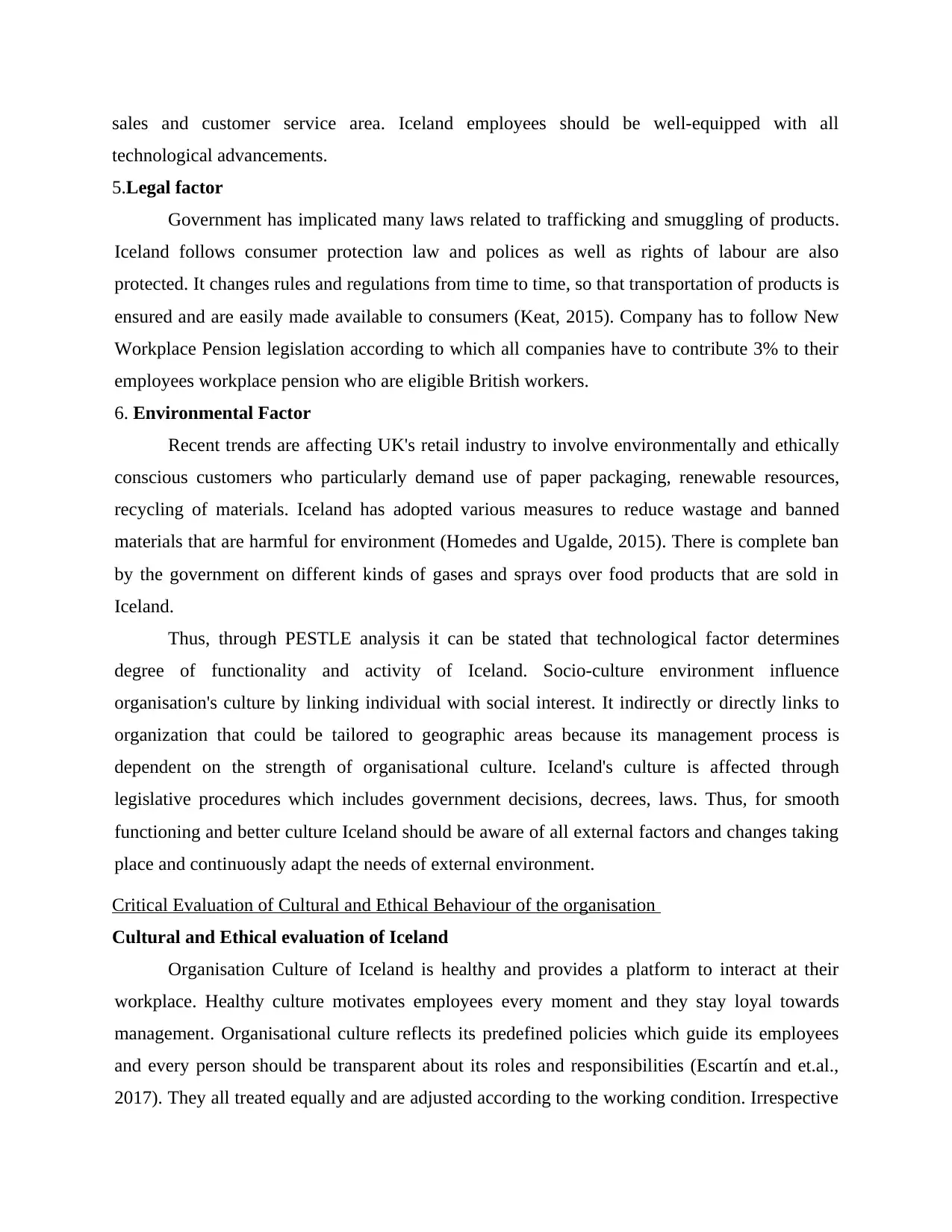
sales and customer service area. Iceland employees should be well-equipped with all
technological advancements.
5.Legal factor
Government has implicated many laws related to trafficking and smuggling of products.
Iceland follows consumer protection law and polices as well as rights of labour are also
protected. It changes rules and regulations from time to time, so that transportation of products is
ensured and are easily made available to consumers (Keat, 2015). Company has to follow New
Workplace Pension legislation according to which all companies have to contribute 3% to their
employees workplace pension who are eligible British workers.
6. Environmental Factor
Recent trends are affecting UK's retail industry to involve environmentally and ethically
conscious customers who particularly demand use of paper packaging, renewable resources,
recycling of materials. Iceland has adopted various measures to reduce wastage and banned
materials that are harmful for environment (Homedes and Ugalde, 2015). There is complete ban
by the government on different kinds of gases and sprays over food products that are sold in
Iceland.
Thus, through PESTLE analysis it can be stated that technological factor determines
degree of functionality and activity of Iceland. Socio-culture environment influence
organisation's culture by linking individual with social interest. It indirectly or directly links to
organization that could be tailored to geographic areas because its management process is
dependent on the strength of organisational culture. Iceland's culture is affected through
legislative procedures which includes government decisions, decrees, laws. Thus, for smooth
functioning and better culture Iceland should be aware of all external factors and changes taking
place and continuously adapt the needs of external environment.
Critical Evaluation of Cultural and Ethical Behaviour of the organisation
Cultural and Ethical evaluation of Iceland
Organisation Culture of Iceland is healthy and provides a platform to interact at their
workplace. Healthy culture motivates employees every moment and they stay loyal towards
management. Organisational culture reflects its predefined policies which guide its employees
and every person should be transparent about its roles and responsibilities (Escartín and et.al.,
2017). They all treated equally and are adjusted according to the working condition. Irrespective
technological advancements.
5.Legal factor
Government has implicated many laws related to trafficking and smuggling of products.
Iceland follows consumer protection law and polices as well as rights of labour are also
protected. It changes rules and regulations from time to time, so that transportation of products is
ensured and are easily made available to consumers (Keat, 2015). Company has to follow New
Workplace Pension legislation according to which all companies have to contribute 3% to their
employees workplace pension who are eligible British workers.
6. Environmental Factor
Recent trends are affecting UK's retail industry to involve environmentally and ethically
conscious customers who particularly demand use of paper packaging, renewable resources,
recycling of materials. Iceland has adopted various measures to reduce wastage and banned
materials that are harmful for environment (Homedes and Ugalde, 2015). There is complete ban
by the government on different kinds of gases and sprays over food products that are sold in
Iceland.
Thus, through PESTLE analysis it can be stated that technological factor determines
degree of functionality and activity of Iceland. Socio-culture environment influence
organisation's culture by linking individual with social interest. It indirectly or directly links to
organization that could be tailored to geographic areas because its management process is
dependent on the strength of organisational culture. Iceland's culture is affected through
legislative procedures which includes government decisions, decrees, laws. Thus, for smooth
functioning and better culture Iceland should be aware of all external factors and changes taking
place and continuously adapt the needs of external environment.
Critical Evaluation of Cultural and Ethical Behaviour of the organisation
Cultural and Ethical evaluation of Iceland
Organisation Culture of Iceland is healthy and provides a platform to interact at their
workplace. Healthy culture motivates employees every moment and they stay loyal towards
management. Organisational culture reflects its predefined policies which guide its employees
and every person should be transparent about its roles and responsibilities (Escartín and et.al.,
2017). They all treated equally and are adjusted according to the working condition. Irrespective
Paraphrase This Document
Need a fresh take? Get an instant paraphrase of this document with our AI Paraphraser
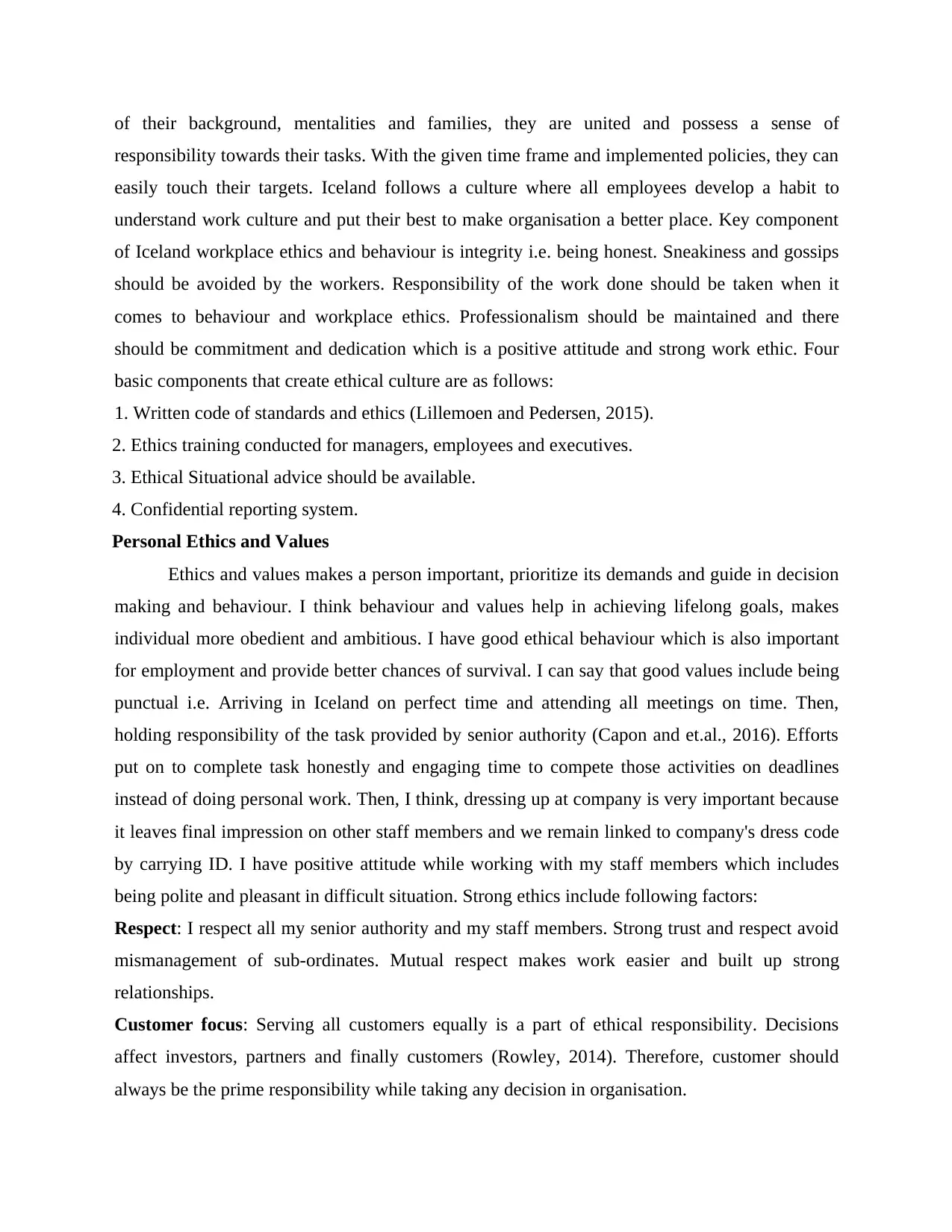
of their background, mentalities and families, they are united and possess a sense of
responsibility towards their tasks. With the given time frame and implemented policies, they can
easily touch their targets. Iceland follows a culture where all employees develop a habit to
understand work culture and put their best to make organisation a better place. Key component
of Iceland workplace ethics and behaviour is integrity i.e. being honest. Sneakiness and gossips
should be avoided by the workers. Responsibility of the work done should be taken when it
comes to behaviour and workplace ethics. Professionalism should be maintained and there
should be commitment and dedication which is a positive attitude and strong work ethic. Four
basic components that create ethical culture are as follows:
1. Written code of standards and ethics (Lillemoen and Pedersen, 2015).
2. Ethics training conducted for managers, employees and executives.
3. Ethical Situational advice should be available.
4. Confidential reporting system.
Personal Ethics and Values
Ethics and values makes a person important, prioritize its demands and guide in decision
making and behaviour. I think behaviour and values help in achieving lifelong goals, makes
individual more obedient and ambitious. I have good ethical behaviour which is also important
for employment and provide better chances of survival. I can say that good values include being
punctual i.e. Arriving in Iceland on perfect time and attending all meetings on time. Then,
holding responsibility of the task provided by senior authority (Capon and et.al., 2016). Efforts
put on to complete task honestly and engaging time to compete those activities on deadlines
instead of doing personal work. Then, I think, dressing up at company is very important because
it leaves final impression on other staff members and we remain linked to company's dress code
by carrying ID. I have positive attitude while working with my staff members which includes
being polite and pleasant in difficult situation. Strong ethics include following factors:
Respect: I respect all my senior authority and my staff members. Strong trust and respect avoid
mismanagement of sub-ordinates. Mutual respect makes work easier and built up strong
relationships.
Customer focus: Serving all customers equally is a part of ethical responsibility. Decisions
affect investors, partners and finally customers (Rowley, 2014). Therefore, customer should
always be the prime responsibility while taking any decision in organisation.
responsibility towards their tasks. With the given time frame and implemented policies, they can
easily touch their targets. Iceland follows a culture where all employees develop a habit to
understand work culture and put their best to make organisation a better place. Key component
of Iceland workplace ethics and behaviour is integrity i.e. being honest. Sneakiness and gossips
should be avoided by the workers. Responsibility of the work done should be taken when it
comes to behaviour and workplace ethics. Professionalism should be maintained and there
should be commitment and dedication which is a positive attitude and strong work ethic. Four
basic components that create ethical culture are as follows:
1. Written code of standards and ethics (Lillemoen and Pedersen, 2015).
2. Ethics training conducted for managers, employees and executives.
3. Ethical Situational advice should be available.
4. Confidential reporting system.
Personal Ethics and Values
Ethics and values makes a person important, prioritize its demands and guide in decision
making and behaviour. I think behaviour and values help in achieving lifelong goals, makes
individual more obedient and ambitious. I have good ethical behaviour which is also important
for employment and provide better chances of survival. I can say that good values include being
punctual i.e. Arriving in Iceland on perfect time and attending all meetings on time. Then,
holding responsibility of the task provided by senior authority (Capon and et.al., 2016). Efforts
put on to complete task honestly and engaging time to compete those activities on deadlines
instead of doing personal work. Then, I think, dressing up at company is very important because
it leaves final impression on other staff members and we remain linked to company's dress code
by carrying ID. I have positive attitude while working with my staff members which includes
being polite and pleasant in difficult situation. Strong ethics include following factors:
Respect: I respect all my senior authority and my staff members. Strong trust and respect avoid
mismanagement of sub-ordinates. Mutual respect makes work easier and built up strong
relationships.
Customer focus: Serving all customers equally is a part of ethical responsibility. Decisions
affect investors, partners and finally customers (Rowley, 2014). Therefore, customer should
always be the prime responsibility while taking any decision in organisation.
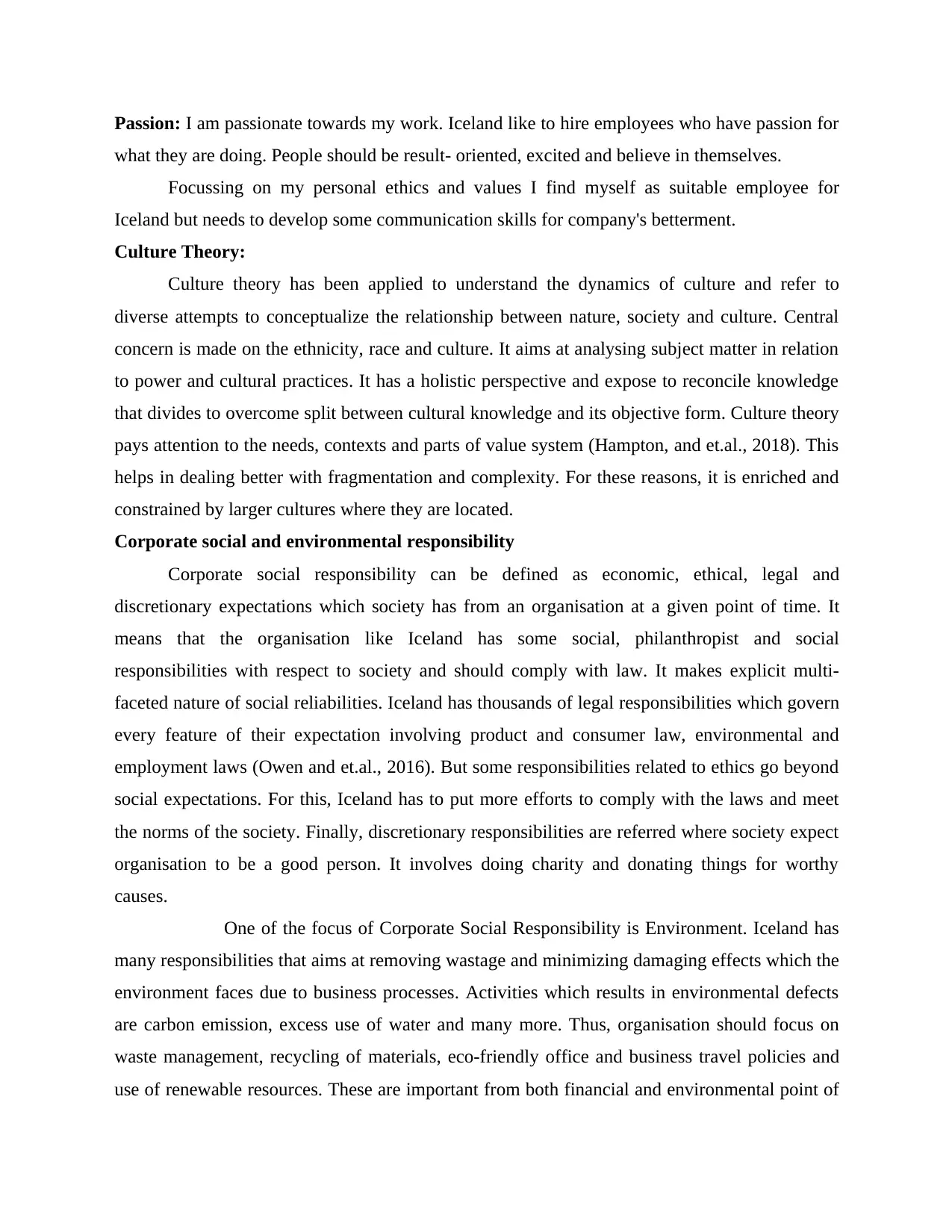
Passion: I am passionate towards my work. Iceland like to hire employees who have passion for
what they are doing. People should be result- oriented, excited and believe in themselves.
Focussing on my personal ethics and values I find myself as suitable employee for
Iceland but needs to develop some communication skills for company's betterment.
Culture Theory:
Culture theory has been applied to understand the dynamics of culture and refer to
diverse attempts to conceptualize the relationship between nature, society and culture. Central
concern is made on the ethnicity, race and culture. It aims at analysing subject matter in relation
to power and cultural practices. It has a holistic perspective and expose to reconcile knowledge
that divides to overcome split between cultural knowledge and its objective form. Culture theory
pays attention to the needs, contexts and parts of value system (Hampton, and et.al., 2018). This
helps in dealing better with fragmentation and complexity. For these reasons, it is enriched and
constrained by larger cultures where they are located.
Corporate social and environmental responsibility
Corporate social responsibility can be defined as economic, ethical, legal and
discretionary expectations which society has from an organisation at a given point of time. It
means that the organisation like Iceland has some social, philanthropist and social
responsibilities with respect to society and should comply with law. It makes explicit multi-
faceted nature of social reliabilities. Iceland has thousands of legal responsibilities which govern
every feature of their expectation involving product and consumer law, environmental and
employment laws (Owen and et.al., 2016). But some responsibilities related to ethics go beyond
social expectations. For this, Iceland has to put more efforts to comply with the laws and meet
the norms of the society. Finally, discretionary responsibilities are referred where society expect
organisation to be a good person. It involves doing charity and donating things for worthy
causes.
One of the focus of Corporate Social Responsibility is Environment. Iceland has
many responsibilities that aims at removing wastage and minimizing damaging effects which the
environment faces due to business processes. Activities which results in environmental defects
are carbon emission, excess use of water and many more. Thus, organisation should focus on
waste management, recycling of materials, eco-friendly office and business travel policies and
use of renewable resources. These are important from both financial and environmental point of
what they are doing. People should be result- oriented, excited and believe in themselves.
Focussing on my personal ethics and values I find myself as suitable employee for
Iceland but needs to develop some communication skills for company's betterment.
Culture Theory:
Culture theory has been applied to understand the dynamics of culture and refer to
diverse attempts to conceptualize the relationship between nature, society and culture. Central
concern is made on the ethnicity, race and culture. It aims at analysing subject matter in relation
to power and cultural practices. It has a holistic perspective and expose to reconcile knowledge
that divides to overcome split between cultural knowledge and its objective form. Culture theory
pays attention to the needs, contexts and parts of value system (Hampton, and et.al., 2018). This
helps in dealing better with fragmentation and complexity. For these reasons, it is enriched and
constrained by larger cultures where they are located.
Corporate social and environmental responsibility
Corporate social responsibility can be defined as economic, ethical, legal and
discretionary expectations which society has from an organisation at a given point of time. It
means that the organisation like Iceland has some social, philanthropist and social
responsibilities with respect to society and should comply with law. It makes explicit multi-
faceted nature of social reliabilities. Iceland has thousands of legal responsibilities which govern
every feature of their expectation involving product and consumer law, environmental and
employment laws (Owen and et.al., 2016). But some responsibilities related to ethics go beyond
social expectations. For this, Iceland has to put more efforts to comply with the laws and meet
the norms of the society. Finally, discretionary responsibilities are referred where society expect
organisation to be a good person. It involves doing charity and donating things for worthy
causes.
One of the focus of Corporate Social Responsibility is Environment. Iceland has
many responsibilities that aims at removing wastage and minimizing damaging effects which the
environment faces due to business processes. Activities which results in environmental defects
are carbon emission, excess use of water and many more. Thus, organisation should focus on
waste management, recycling of materials, eco-friendly office and business travel policies and
use of renewable resources. These are important from both financial and environmental point of
⊘ This is a preview!⊘
Do you want full access?
Subscribe today to unlock all pages.

Trusted by 1+ million students worldwide
1 out of 19
Related Documents
Your All-in-One AI-Powered Toolkit for Academic Success.
+13062052269
info@desklib.com
Available 24*7 on WhatsApp / Email
![[object Object]](/_next/static/media/star-bottom.7253800d.svg)
Unlock your academic potential
Copyright © 2020–2026 A2Z Services. All Rights Reserved. Developed and managed by ZUCOL.





